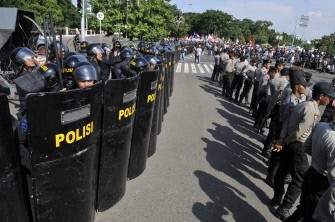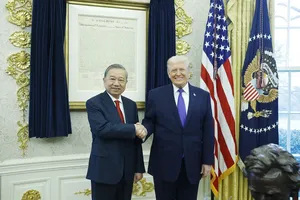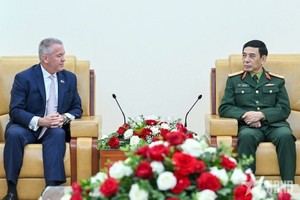JAKARTA, Jan 29, 2010 (AFP) - The Indonesian military is deeply involved in the trade in illegally felled timber that is destroying vast tracts of pristine forest near the Malaysian border, researchers said Friday.
Their findings come days after the government revealed plans to ask foreign governments to contribute to a billion-dollar "green investment fund" to help it cut greenhouse gas emissions through sustainable infrastructure projects.

Environmentalists argue that the government could go a long way towards meeting its target of cutting emissions by 26 percent from 2005 levels by 2020 simply by stopping unchecked illegal logging.
But the new study by the Center for East Asia Cooperation Studies (CEACoS) at the University of Indonesia has revealed how difficult this could be, given the military's involvement in the illicit trade.
CEACoS executive director Tirta N. Mursitama, the head researcher in the project, said the military acted as a coordinator, investor, facilitator and middleman for the illegal loggers.
"Military personnel from low ranked soldiers to territorial commanders were involved in the practice of illegal logging in the border areas," he told AFP.
"The military personnel acted as coordinators, investors and people who deliberately failed to monitor the flow of logging transport."
The study covered the period between 1999 and 2006 in East Kalimantan, on the Indonesian side of Borneo where forests are being stripped for timber and palm oil plantations faster than anywhere else in the world.
Deforestation in places like Sumatra, Papua and Borneo is a major contributor to greenhouse gas emissions blamed for climate change, scientists believe.
As much as 20 percent of global carbon dioxide emissions are estimated to come from forest destruction.
Mursitama said some high-ranking military officers received kickbacks from subordinates involved in illegal logging, while others fostered close relationships with the "cukong", or godfathers of the business.
Other levels of involvement included direct investment in logging companies and taking bribes for arranging logging permits from the forestry ministry.
A military spokesman said he had not seen the study and could not comment, but promised to "follow up" on its findings.
Rear Admiral T.H. Soesetyo, from the Directorate General of Defense Strategy at the Defense Ministry, acknowledged to The Jakarta Post that some officers supplemented their meagre incomes with blackmarket timber.
"Life at the border areas can be difficult for soldiers," he said.
Few Indonesian military personnel have ever been punished for their involvement in illegal logging.
US-based Human Rights Watch said last month that between 2003 and 2006, mismanagement and corruption in the timber industry cost Indonesia two billion dollars a year in lost revenue.
The forestry ministry claims it is cracking down on illegal logging as part of the drive to cut carbon emissions, and has produced figures indicating it expects the trade to all but disappear by 2020.
But environmentalists have scoffed at the predictions, dismissing them as a "green-wash campaign" to mask the government's inaction.
Indonesia announced earlier this week it is hoping to draw hundreds of millions of dollars from developed countries such as Australia, Britain, Japan and the United States to fund "green infrastructure" schemes.
Jakarta says it needs the money to help it meet its emissions targets.
























